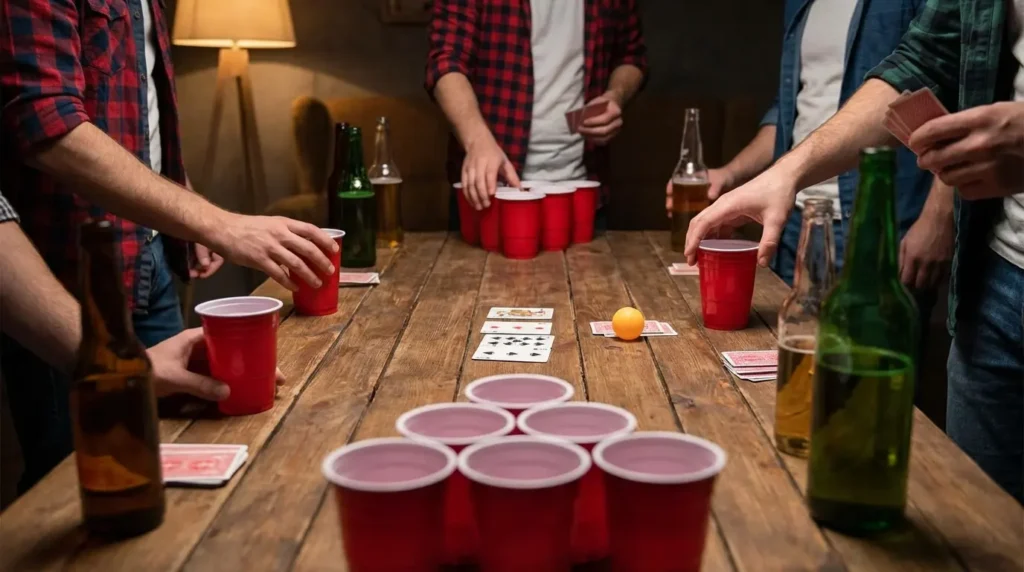Hi, Friend! Jen Glantz here. I’m a bestselling author, the first ever bridesmaid for hire and have been hired by hundreds of brides all over the world. Let’s talk about bachelor drinking games.
Look, planning the groom’s send-off takes more than just buying a keg and hoping the vibes sort themselves out. I learned this the hard way. I once tried to host a beer pong tournament without actually checking the venue first. Did you know a regulation table needs to be eight feet long? I didn’t. We ended up hunched over a knee-high coffee table, spilling cheap beer on a rug that definitely wasn’t ours. It ruined the flow and my back.
You have to know the rules, the setup, and the crowd before you crack the first tab. Bachelor drinking games are usually the backbone of the weekend, but if you don’t have the logistics down, they’re just a hassle. This guide cuts through the fluff to give you the best options for keeping the energy up and the awkward silences down. We’re talking everything from chill card games to the high-energy bachelor party drinking games that usually end with someone shirtless.
Quick Resources:
-
Generate instant game ideas with the free Bachelorette Games Generator
-
Stay organized across the weekend using the Bachelor Party Planner
-
Keep costs fair with the free Bachelor Budget Calculator
-
Explore everything available in All Bachelor Party Tools
-
Access the full planning suite in All Wedding Tools
TL;DR
If you’re skimming this on your phone and just need the highlights, here’s the deal: Match the game to the energy and the space. You can’t play Civil War in a crowded hotel suite. We’ve put together 20 solid options, from meta-games mocking “The Bachelor” to physical challenges. Just remember to look out for the non-drinkers and keep it simple if you’re traveling. Picking the right bachelor drinking game can save the night from turning into a logistical nightmare.
| Vibe / Setting | Recommended Game | Avoid This Game | Why? |
|---|---|---|---|
| Chill Hotel Room | Pizza Box or Jackbox | Civil War | You do not want to pay the cleaning fee for beer on the carpet. |
| Backyard BBQ | Flip Cup or Cornhole | Mario Kart | You’re outside—keep people moving, don’t stare at a screen. |
| Crowded City Bar | Pub Golf | King’s Cup | Cards get sticky or lost; at bars, you need mobility. |
| Mixed Ages (Dads) | Pub Golf (Casual) | Edward Fortyhands | Respect the stamina gap and don’t make the Dad chug 80oz of malt liquor. |
- Check the Vibe: Don’t force a complex strategy card game on a group that just wants to jump in the pool.
- Mind the Logistics: If you’re flying to the destination, stick to cards or apps. Don’t check a bag just for red solo cups.
- Include Everyone: Make sure the rules let the groom’s dad or the designated driver play without getting destroyed.
- Location Matters: Public bars need discretion. Private Airbnbs are where you can get messy and loud.
- Use Tools: You don’t have to be a hero; use templates to save yourself the planning headache.
Skip the guesswork and generate games instantly with the free Bachelorette Games Generator
Read The Room Before You Pour
Before you force everyone to chug from a communal cup (gross, by the way), assess the dynamic. A good weekend hinges on reading the room: energy, supplies, inclusivity, and location. High-energy stuff like Flip Cup falls flat in a quiet lounge, and complex rules kill the buzz at a rowdy pool party.
Also, think about who is actually playing. Alienating the father of the groom or the DD with aggressive hazing rules is a rookie move. If you have a mixed crowd or guys who don’t drink, mix in some wholesome bachelor party ideas that are more about hanging out than blacking out. Always match the activity to the environment. Finding the perfect bachelor drinking game is mostly just understanding your audience.
Match games to your group’s vibe using the free Bachelorette Games Generator
The “Father-in-Law” Factor: Imagine you are playing “Most Likely To” and the question is “Who is most likely to cheat on their taxes?” Everyone points to the groom’s future father-in-law. Dead silence.
The Fix: If older relatives or conservative guests are around, swap the roast-heavy games for skill-based ones like Beer Pong or Cornhole. It keeps the competitive spirit without the risk of a family feud.
The “Right Reasons” Reality TV Tribute
Since the franchise has become a weirdly ironic staple for bachelor weekends, these meta-games lean into how ridiculous reality TV is. These are great for a hangover morning or chill downtime where you want to roast the concept of “finding love” while cracking a cold one. Here are a few variations of the bachelor drinking game that turn the show’s tropes into hydration hazards.
Pull themed game ideas in seconds with the free Bachelorette Games Generator
1. The Bachelor Drinking Game (Classic TV Edition)
Throw on a classic episode and drink every time a contestant says they’re “here for the right reasons,” talks about a “connection,” or starts crying. Finish your drink if the Bachelor kisses someone right in front of the other girls. This version of the bachelor drinking game works best in a living room when everyone is too tired to move but still wants to keep the party going.
I find this specific bachelor drinking game is actually great for bridging the gap between different friend groups because everyone can bond over how awkward the show is. You don’t even need a full season; a YouTube highlight reel of cringey moments works just as well.
2. Bachelor in Paradise Drinking Game
This spinoff is pure chaos, which is better for a party. Drink whenever the camera cuts to a crab or a lizard, someone complains about the heat, or a “date card” shows up. If a couple goes to the “Boom Boom Room,” everyone takes a shot. It fits perfectly in an Airbnb when you want to roast the show and get a buzz going.
3. The Final Rose Roulette
Inspired by the elimination ceremony, one guy acts as the Bachelor holding a beer instead of a rose. He asks the group a question, and whoever gives the best answer gets the beer. The person with the worst answer takes a shot. It captures the tension of the bachelor drinking game without actually having to turn on the TV.
Classic Competition for the Skilled Drinkers
These are for the groups that want to get loud and competitive. They require tables and cups, so they’re best for a garage, backyard, or game room where spilling is acceptable. Managing this stuff is part of the job, so if you’re feeling lost, check a guide to being a best man to make sure you’re handling the logistics right.
When you look for the best bachelor party drinking games, you always end up with these staples because they work. They rely on skill, meaning the soberest person usually wins, which naturally balances the playing field. Check the table below to see what fits your venue.
| Game Title | Equipment Needed | Mess Level (1-10) | Best Location |
|---|---|---|---|
| Beer Pong | 8ft Table, 20+ Cups, 2 Balls | 6/10 | Garage / Basement |
| Flip Cup | Long Table, 1 Cup per person | 8/10 | Backyard / Patio |
| Civil War | Long Table, 6-10 Cups per person | 10/10 | Outdoors (Grass only—trust me) |
| Stack Cup | Round Table, 20+ Cups, 2 Balls | 9/10 | Kitchen Island |
Find low-logistics games fast with the free Bachelorette Games Generator
4. Beer Pong (The Staple)
You know this one. Two teams, 10 cups per side. You throw ping pong balls at the opponent’s cups; if you sink it, they drink it. It’s the classic high-energy game that demands a table and plenty of beer. Pro tip: bring extra balls. Someone will step on one, or it’ll roll under a couch never to be seen again.
5. Flip Cup
Teams line up on opposite sides of a table for a relay race. Chug your cup, then flip it upside down by flicking the rim so it lands flat. It builds massive team energy and works anywhere you can find a long table. It is arguably the best bachelor drinking game for getting everyone standing on chairs and yelling.
6. Civil War
Imagine Beer Pong but with absolutely no turns and total chaos. Two teams of three shoot at each other’s cups simultaneously. If your cup gets hit, you drink and refill immediately. The game only ends when one team runs out of cups. It is rapid, messy, and you should definitely play this outside.
7. Stack Cup (Slap Cup)
Players stand around a round table bouncing a ball into a cup and passing it to the left. If the guy to your left makes his shot before you do, he slaps your cup away, forcing you to drink from the center “bitch cup.” It’s fast, relies on reflexes, and gets very loud.
Card & Dice Games for Low Logistics
When you’re traveling or just don’t want to carry a folding table, these games only require a deck of cards, some dice, or a pizza box. They’re perfect for hotel rooms, bars, or late-night sessions where you actually want to talk to each other. Sometimes the best bachelor drinking game is the one you can fit in your back pocket.
Get travel-friendly game ideas from the free Bachelorette Games Generator
8. King’s Cup (Ring of Fire)
Spread a deck of cards around a central cup. Each card has a rule like “Guys drink” or “Thumb Master.” Drawing a King means you pour some of your drink into the center cup. The unlucky soul who draws the fourth King has to chug the dirty pint. It’s the ultimate icebreaker.
9. Ride the Bus
The dealer lays out a pyramid of cards. Players have to guess things like red or black to avoid drinking. The loser has to “ride the bus,” playing through the pyramid alone until they win. This game focuses the pressure on one “loser” at a time and works great at a bar booth.
10. Pizza Box
Flip a coin onto an open, greasy pizza box. Draw a circle where it lands and write a rule inside. If someone else lands in your circle, they follow your rule. If they land in a blank space, they make a new one. It’s a creative game perfect for 2 AM hotel hangouts.
Creative Rule Idea: You land on a blank space and draw a circle labeled “The T-Rex.”
The Rule: Anyone who lands here must drink with their elbows tucked into their ribs (like a T-Rex) for the rest of the game. If they get caught extending their arms, penalty shot.
11. Three Man
This dice game designates one player as the “Three Man” who drinks anytime a three is rolled or the dice add up to three. It’s casual enough to allow for conversation while playing on any flat surface.
Video Games & Tech for the Digital Age
Use the tech you already have. These options are great for living room setups where you want to sit comfortably on a couch while competing. A digital bachelor drinking game also saves you the cleanup time.
12. Mario Kart: Don’t Drink and Drive
You have to finish your entire beer before the race ends, but here’s the catch: you cannot drink while your kart is moving. You have to pull over to a complete stop to chug. Watching someone parked on the shoulder chugging a beer while getting lapped is hilarious.
13. Jackbox Games (Quiplash/Fibbage)
Use your phones as controllers. The group answers prompts on the TV, and everyone votes on the funniest responses. The loser of each round takes a shot. It’s inclusive for the non-gamers and keeps the vibe witty.
14. FIFA/Madden “Score & Pour”
Play a match. Conceding a goal or touchdown costs you five drinks. A yellow card or flag is two drinks. A red card or turnover is a shot. Chill option for smaller groups hanging out on the couch.
On the Town: Public & Bar Games
If your itinerary involves hitting the city, these games add structure to the bar crawl. They require discretion—don’t get kicked out—and interaction with the public. If you’re still deciding where to host these crawls, check out some underrated bachelor party destinations that offer great nightlife without the massive crowds. Taking your bachelor drinking games to the streets requires a bit more planning, but it’s worth it.
15. Pub Golf
Create a course of 9 or 18 bars. Each venue has a specific drink designated as “Par.” Finishing a drink in fewer sips lowers your score. It encourages movement and exploration, especially if you commit to the golf attire (visors and polo shirts recommended).
| Hole # | Type of Venue | “Par” Drink | Par (Sips) | Penalty for Bogey |
|---|---|---|---|---|
| 1 | Dive Bar | Domestic Draft Beer | 4 Sips | Buy a round of peanuts |
| 2 | Irish Pub | Guinness Pint | 5 Sips | Do an Irish jig |
| 3 | Cocktail Lounge | Gin & Tonic | 2 Sips | No talking for 10 mins |
| 4 | Sports Bar | Tequila Shot | 1 Sip | Wear a rival team’s hat |
16. The Forbidden Word
Pick a common word like “drink,” “wedding,” or the bride’s name. It cannot be spoken for the entire night. If you slip up, you buy the next round or take a sip. This runs in the background of the entire evening and catches people when they least expect it.
17. Photo Scavenger Hunt
Teams race to complete a list of tasks, like getting a picture with a bachelorette party or finding a bartender named Mike. Losers buy breakfast the next day. It forces you to be social and talk to strangers.
Endurance & Gimmicks for the Brave
These games are high-intensity or rely on a specific gimmick. Keep these for the pre-game or a private house where you can get a little wild without worrying about getting arrested. To keep the energy high, make sure you have the perfect playlist—check out these ultimate bachelor party songs. An endurance bachelor drinking game separates the boys from the men.
18. Thunderstruck
Stand in a circle playing the AC/DC song “Thunderstruck.” The first person drinks when they hear “Thunder” and doesn’t stop until the word is sung again, then the next person starts. There are long guitar solos in that song. You have been warned.
19. Edward Fortyhands
Duct tape a 40oz beer to each of the groom’s hands. He literally cannot use his hands for anything else—phone, bathroom, eating—until the bottles are empty. This is intense. Make sure he consents to this before the tape comes out.
20. Most Likely To
Count to three and point at the person “most likely to” commit a specific act or fit a scenario. The person with the most fingers pointed at them drinks. It’s a roast-heavy bonding experience perfect for a campfire.
Don’t Let Planning Ruin the Party
The Best Man often carries the weight of the world on his shoulders, trying to manage logistics, personalities, and cash flow without losing his mind. You want the groom to have the time of his life, but drowning in spreadsheets isn’t the way to do it. This is where Bridesmaid for Hire actually helps.
Jen Glantz built her reputation supporting brides, but her bachelor and bachelorette party planning tools are a game-changer for the guys too. You can grab professional itineraries, speech-writing help, and support for handling difficult guests. Use these resources to handle the boring stuff so you can focus on winning that game of Beer Pong. Even the best bachelor party drinking games can’t save a weekend if the logistics are a mess.
Handle games without overthinking using the free Bachelorette Games Generator
The DIY vs. Pro Template Difference:
- DIY Approach: You spend 6 hours googling ideas, 4 hours arguing in the group chat about money, and 2 hours calling bars that don’t take reservations.
- Using a Template: You download a pre-set itinerary, plug in the dates, and use a pre-written email to collect money. Total time: 45 minutes.
Final Thoughts
At the end of the day, the specific game matters less than the memories you create with the boys. Whether you’re sweating through a round of Civil War or laughing at a bad answer in Jackbox, the goal is to celebrate the groom and bond with the crew. Pick the games that fit your vibe, respect everyone’s limits, and don’t be afraid to use some tools to help with the planning. Now, grab a cup, pick your favorite bachelor drinking game, and get the night started.
1-800-BRIDESMAID
The Newlywed
Card Game
something extra to love
Read the weekly newsletter from Bridesmaid for Hire, 1-800-Bridesmaid, to hear about real stories, from strangers, who need advice on love, life, friendship, and so much more.
Looking for the perfect wedding gift for someone you adore? Grab The Newlywed Card Game. It's a fun and interactive game they can play on their honeymoon or future date nights.














